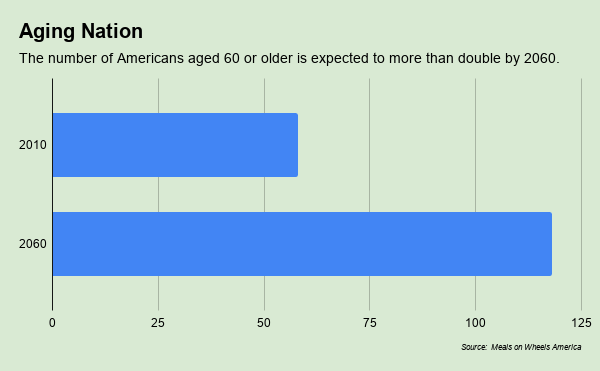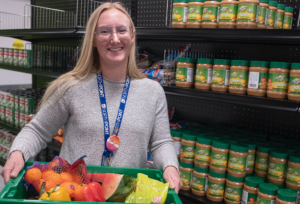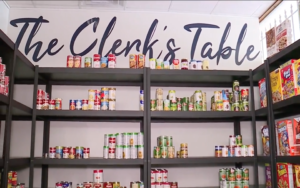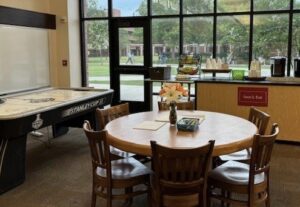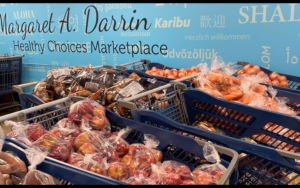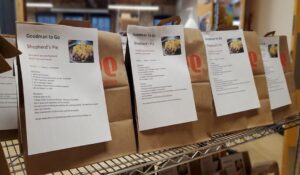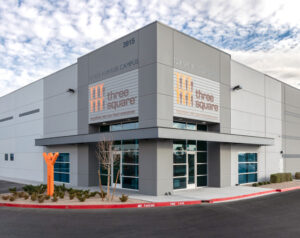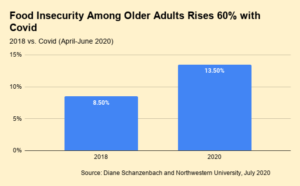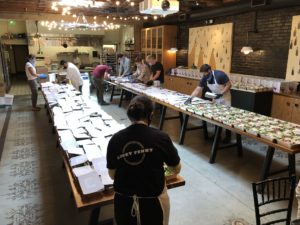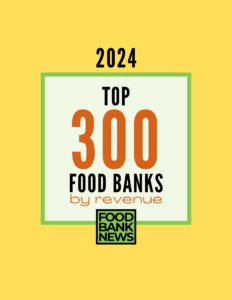With a small financial commitment and the help of about a dozen volunteers, a food pantry in Oregon is finding it’s not so hard to make a big difference in the lives of the homebound in its community.
A program to deliver food once a month to elderly and disabled people, now in its sixth year at the South Corvallis Food Bank, came into being when Grant Carlin, now the Board President, couldn’t ignore the evidence of hardship around him. He noted some clients at the pantry having difficulty navigating the space. And as a Meals on Wheels volunteer, he observed that some clients had very little food in the house beyond the one meal per day they were given.
Carlin’s observations in South Corvallis are a microcosm of larger trends facing the country. The population of Americans 60 or older is set to more than double from 58 million in 2010 to 118 million in 2060, according to Meals on Wheels America, increasing the possibility of food insecurity among that group. Currently, 5.5 million seniors are food insecure, according to the most recent Feeding America estimates. Disabilities also weigh on public health, with 61 million people, or about 26% of all adults, living with a disability, according to the Centers for Disease Control, with the largest percentage having an issue with mobility.

The upshot is that people with mobility issues and in need of food exist in every county of the nation. “I’m sure in every community there is a need, and it’s not being met,” Carlin said.
Increasingly, food banks are gearing up to meet the need. Greater Chicago Food Depository announced in November it would build a huge new kitchen to prepare fresh food to deliver to the homebound. In Buffalo, the regional food bank officially merged with the local Meals on Wheels program at the end of 2019, creating a new entity, FeedMore WNY, which will be better equipped to deliver freshly made meals.
South Corvallis Food Bank, which serves more than 1,300 people a month at its grocery-store style food pantry, did not need to invest much money or manpower into its home delivery effort. Initially, it spent about $300 on refrigerated bags for transporting perishable food. Annually, it spends about $250 on the program to cover mailings and administrative expenses.
A group of about 12 volunteers do the deliveries, working in teams of two. Each team does four to five deliveries, following a route mapped out in advance. Deliveries happen on the third Saturday of the month (when many have run out of their monthly SNAP benefits), and a full route takes about one to two hours to complete.
The hardest part of getting the program up and running was identifying the clients, Carlin said. He began the search by reaching out to a former social services representative who was able to give him the names of five people. When he contacted them in person and explained the program, all jumped at the opportunity, Carlin said.
From the original five, South Corvallis Food Bank now has a steady client base of 16 to 22 households. Last year, it made 204 deliveries, serving 405 people city-wide.
During the deliveries, volunteers bring in about a shopping cart’s worth of food and unpack the perishables so they can take back the refrigerated bags. Clients receive an order form along with a stamped envelope, which they use to mail back their choices for their next delivery. They also sign a form required by the USDA.
While about one-quarter of the homebound clients also receive Meals on Wheels once a day Monday through Friday, others may not qualify because of their age. Clients include a young victim of a car accident, those recovering from surgery and a young mother dealing with several ailments in the family. “There really is a need out there,” Carlin said.
Please contact Grant Carlin at carlingrant@gmail.com or 541-745-3968 for advice on how to start a home delivery program at your pantry.
